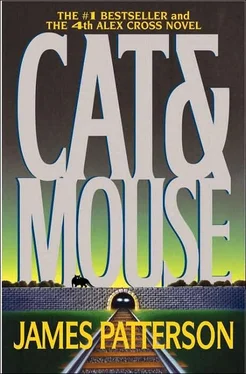She was part of a case that was important to the press now. And dangerous, too. They had absolutely no respect for her privacy or feelings. Reporters would show up at the school and try to question other teachers. They called her at home so frequently that she finally changed her number to an unlisted one.
She heard the whoop of nearby police or ambulance sirens and the unpleasant sound brought her out of her reverie. She sighed. She was almost there now.
She shut her eyes and took deep, slow breaths. She dropped her head down near her chest. She was tired and thought she needed a good cry.
“Are you all right, Ms. Johnson?” agent Dampier inquired. He’s got eyes in the back of his head. He’s been watching me, Christine thought. He’s watching everything that happens, but I guess that’s good.
“I’m fine.” She opened her eyes and offered a smile. “Just a little tired is all. Too many early mornings and late nights.”
Agent Dampier hesitated, then he said, “I’m sorry it has to be this way.”
“Thank you,” she whispered. “You make it a lot easier for me with your kindness. And you’re a real good driver,” she kidded agent Denjeau, who mostly kept quiet, but laughed now.
The FBI sedan hurtled down a steep concrete ramp and entered the building from the rear. This was a delivery entrance, she knew by now. She noticed that she was hugging herself again. Everything about the nightly trip seemed so unreal to her.
Both agents escorted her upstairs, right to the door, at which point they stepped back and she entered alone.
She gently closed the door and leaned against it. Her heart was pounding-it was always this way.
“Hello, Christine,” Alex said, and she went and held him so tight, so tight, and everything was suddenly so much better. Everything made sense again.
MY FIRST morning back in Washington, I decided to visit the Cross house on Fifth Street again. I needed to look over Cross’s notes on Gary Soneji one more time. I had a deepening sense that Alex Cross knew his assailant, had met the person at some time before the vicious attack.
As I drove to the house through the crowded D.C. streets I went over the physical evidence again. The first really significant clue was that the bedroom where Cross was attacked had been tightly controlled. There was little or no evidence of chaos, of someone being out of his mind. There was ample evidence that the assailant was in what is called a cold rage.
The other significant factor was the evidence of “overkill” in the bedroom. Cross had been struck half a dozen times before he was shot. That would seem to conflict with the tight control at the crime scene, but I didn’t think so: Whoever came to the house had a deep hatred for Cross.
Once inside the house, the attacker operated as Soneji would have. The assailant had hidden in the cellar. Then he copycatted an earlier attack Soneji had made at the house. No weapons had been found, so the attacker was definitely clearheaded. No souvenirs had been taken from Cross’s room.
Alex Cross’s detective shield had been left behind. The attacker wanted it found. What did that tell me-that the killer was proud of what he had accomplished?
Finally, I kept returning to the single most striking and meaningful clue so far. It had jumped at me from the first moment I arrived on Fifth Street and began to collect data.
The attacker had left Alex Cross and his family alive. Even if Cross died, the assailant had departed from the house with the knowledge that Cross was still breathing.
Why would the intruder do that? He could have killed Cross. Or was it always part of a plan to leave Cross alive? If so, why?
Solve that mystery, answer that question-case solved.
THE HOUSE was quiet, and it had a sad and empty feeling, as houses do when a big, important piece of the family is missing.
I could see Nana Mama working feverishly in her kithen. The smell of baking bread, roast chicken, and baked sweet potatoes flowed through the house, and it was soothing and reassuring. She was lost in her cooking, and I didn’t want to disturb her.
“Is she okay?” I asked Sampson. He had agreed to meet me at the house, though I could tell he was still angry about my leaving the case for a few days.
He shrugged his shoulders. “She won’t accept that Alex isn’t coming back, if that’s what you mean,” he said. “If he dies, I don’t know what will happen to her.”
Sampson and I climbed the stairs in silence. We were in the hallway when the Cross children appeared out of a side bedroom.
I hadn’t formally met Damon and Jannie, but I had heard about them. Both children were beautiful, though still showing bruises from the attack. They had inherited Alex’s good looks. They had bright eyes and their intelligence showed.
“This is Mr. Pierce,” Sampson said, “he’s a friend of ours. He’s one of the good guys.”
“I’m working with Sampson,” I told them. “Trying to help him.”
“Is he, Uncle John?” the little girl asked. The boy just stared at me-not angry, but wary of strangers. I could see his father in Damon’s wide brown eyes.
“Yes, he is working with me, and he’s very good at it,” Sampson said. He surprised me with the compliment.
Jannie stepped up close to me. She was the most beautiful little girl, even with the lacerations and a bruise the size of a baseball on her cheek and neck. Her mother must have been a beautiful woman.
She reached out and shook my hand. “Well, you can’t be as good as my daddy, but you can use my daddy’s bedroom,” she said, “but only until he comes back home.”
I thanked Jannie, and nodded respectfully at Damon. Then I spent the next hour and a half going over Cross’s extensive notes and files on Gary Soneji. I was looking for Soneji’s partner. The files dated back over four years. I was convinced that whoever attacked Alex Cross didn’t do it randomly. There had to be a powerful connection with Soneji, who claimed to always work alone. It was a knotty problem and the profilers at Quantico weren’t making headway with it either.
When I finally trudged back downstairs, Sampson and Nana were both in the kitchen. The uncluttered and practical-looking room was cozy and warm. It brought back memories of Isabella, who had loved to cook and was good at it, too, memories of our home and life together.
Nana looked up at me, her eyes as incisive as I remembered. “I remember you,” she said. “You were the one who told me the truth. Are you close to anything yet? Will you solve this terrible thing?” she asked.
“No, I haven’t solved it, Nana,” I told her the truth again. “But I think Alex might have. Gary Soneji might have had a partner all along.”
A RECURRING THOUGHT was playing constantly inside my head: Who can you trust? Who can you really believe? I used to have somebody-Isabella.
John Sampson and I boarded an FBI Bell Jet Ranger around eleven the following morning. We had packed for a couple of days’ stay.
“So who is this partner of Soneji’s? When do I get to meet him?” Sampson asked during the flight.
“You already have,” I told him.
We arrived in Princeton before noon and went to see a man named Simon Conklin. Sampson and Cross had questioned him before. Alex Cross had written several pages of notes on Conklin during the investigation of the sensational kidnapping of two young children a few years back: Maggie Rose Dunne and Michael “Shrimpie” Goldberg. The FBI had never really followed up on the extensive reports at the time. They wanted the high-profile kidnapping case closed.
I’d read the notes through a couple of times now. Simon Conklin and Gary had grown up on the same country road, a few miles outside the town of Princeton. The two friends thought of themselves as “superior” to other kids, and even to most adults. Gary had called himself and Conklin the “great ones.” They were reminiscent of Leopold and Loeb, two highly intelligent teens who had committed a famous thrill killing in Chicago one year.
Читать дальше












